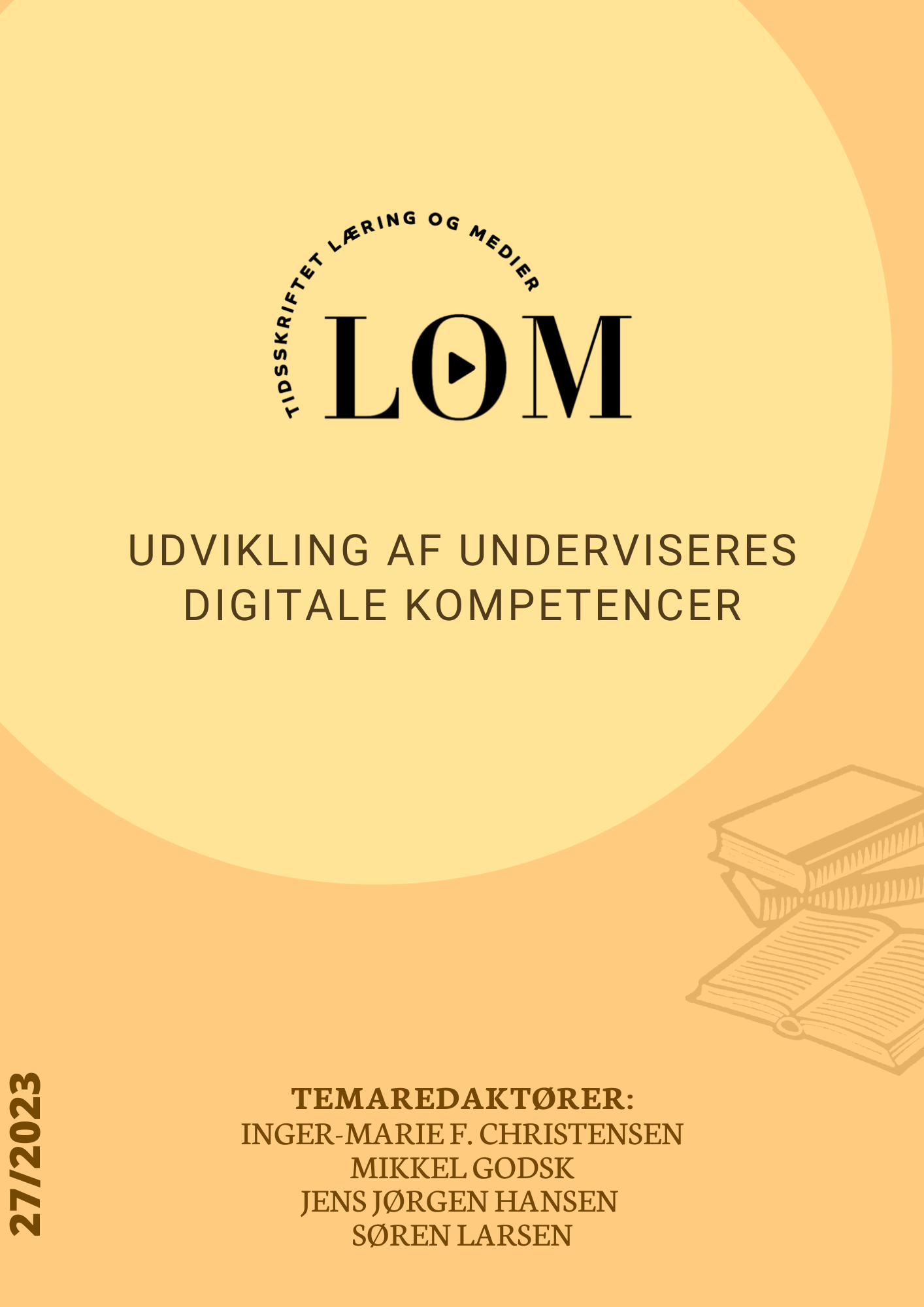Digital competencies for university teachers
Perspectives from the university's meso level
DOI:
https://doi.org/10.7146/lom.v15i27.134294Keywords:
digital competence, competencies development, organisational development, DigCompEdu, Frameworks, Case studyAbstract
The European framework DigCompEdu describes the digital competencies of an individual teacher, however the University of Copenhagen used the framework in 202o to explore, how the university as an organization supports digital competencies development.
The purpose of this exercise was to avoid competence development becoming an individualized problem. This article describes this work and examines, as a case study, results when educational e-learning consultants and system owners use an individual-oriented framework such as DigCompEdu as an analytical tool. Based on cases, reconstructed from notes, minutes and observations, we conclude that the framework's focus on the individual teacher maintains the focus on the end user for the supporting units in the organization, and that mapping can identify how the organization weights its course and IT system offerings in relation to local educational culture. This can allow consultants and system owners to take on more proactive role and help create a better overview of an otherwise complex field, thereby helping teachers navigate it.
Downloads
References
Basilotta-Gómez-Pablos, V., Matarranz, M., Casado-Aranda, L.-A., & Otto, A. (2022). Teachers’ digital competencies in higher education: A systematic literature review. International Journal of Educational Technology in Higher Education, 19(1), 8. https://doi.org/10.1186/s41239-021-00312-8
Caena, F., & Redecker, C. (2019). Aligning teacher competence frameworks to 21st century challenges: The case for the European Digital Competence Framework for Educators (Digcompedu). European Journal of Education, 54. https://doi.org/10.1111/ejed.12345
Council of Europe Education Committee (Red.). (2001). Common European framework of reference for languages: Learning, teaching, assessment (6th print). Cambridge Univ. Press.
CUTE Toolkit—CUTE Toolkit. (u.å.). Hentet 17. oktober 2022, fra https://cutetoolkit.ku.dk/
Flyvbjerg, B. (2015). Fem misforståelser om casestudiet. I Brinkmann Svend & Tanggaard Lene (Red.), & Ole Thornye & Bjørn Nake (Overs.), Kvalitative metoder: En grundbog. (2. udgave., s. 497–520). Hans Reitzel.
Grodecka, K., & Hmiedat, P. (2021, juli 2). IO1 report: Mapping. University of Copenhagen. https://cute.ku.dk/outputs/mapping/
Kampylis, P., Punie, Y., & Devine, J. (2015, december 14). Promoting Effective Digital-Age Learning: A European Framework for Digitally-Competent Educational Organisations. JRC Publications Repository. https://doi.org/10.2791/54070
Københavns Universitet. (2019, marts 25). Competencies for Universities - using Technology in Education: Putting the DigCompEdu framework into practice in the Higher Education realities. University of Copenhagen. https://cute.ku.dk/
Madelung, B. (2022). Pædagogisk kompetenceudvikling på de videregående uddannelser (1. udgave). Frydenlund.
Mercader, C., & Gairín, J. (2020). University teachers’ perception of barriers to the use of digital technologies: The importance of the academic discipline. International Journal of Educational Technology in Higher Education, 17(1), 4. https://doi.org/10.1186/s41239-020-0182-x
Online og Blended Learning. (u.å.). Hentet 17. oktober 2022, fra https://obl.ku.dk/
Redecker, C. (2017, november 28). European Framework for the Digital Competence of Educators: DigCompEdu. JRC Publications Repository. https://doi.org/10.2760/178382
Rektoratet KU. (2017, november 2). Talent og samarbejde—Strategi 2023. Københavns Universitet. https://om.ku.dk/strategi2023/
Stake, R. E. (2005). Qualitative Case Studies. I Denzin Norman K & Lincoln Yvonna S (Red.), The SAGE handbook of qualitative research (3. edition.). Sage Publications.
Ulriksen, L. M. (2004). Den implicitte studerende. Dansk Pædagogisk Tidsskrift, 3.
Vuorikari, R., Kluzer, S., & Punie, Y. (2022, marts 17). DigComp 2.2: The Digital Competence Framework for Citizens - With new examples of knowledge, skills and attitudes. JRC Publications Repository. https://doi.org/10.2760/115376
Aarhus Universitet. (u.å.). Aarhus Universitets strategi 2020-2025. Hentet 17. oktober 2022, fra https://www.au.dk/om/profil/strategi
Downloads
Published
How to Cite
Issue
Section
License
Copyright (c) 2023 Annette Q Pedersen, Julie Marie Isager

This work is licensed under a Creative Commons Attribution-NonCommercial-NoDerivatives 4.0 International License.

Articles published in the Journal of Learning and Media are licensed under a Creative Commons Attribution-NonCommercial-NoDerivatives 3.0 Unported Licens.
Authors retain copyright and grant the journal right of first publication; simultaneously articles are licensend under the Creative Commons Attribution license: Attribution-NonCommercial-NoDerviatives (by-nc-nd). Read about this license at https://creativecommons.org/licenses/by-nc-nd/3.0/
---
At LOM.dk, you will also find articles from the discontinued Journal for the Continuing and Further Education of the Danish Universities (UNEV). Note that special rules apply to UNEV articles:
It is the authors and any other copyright holder who have the copyright of articles published under the auspices of UNEV, and access to the articles is contingent on users acknowledging and complying with the associated legal guidelines:
- Users may download and print one copy of any UNEV publication for private studies or research.
- The redistribution of articles or the use of these for revenue-funded activities or commercial purposes are not allowed.
- It is not allowed to distribute the URLs of UNEV articles.


